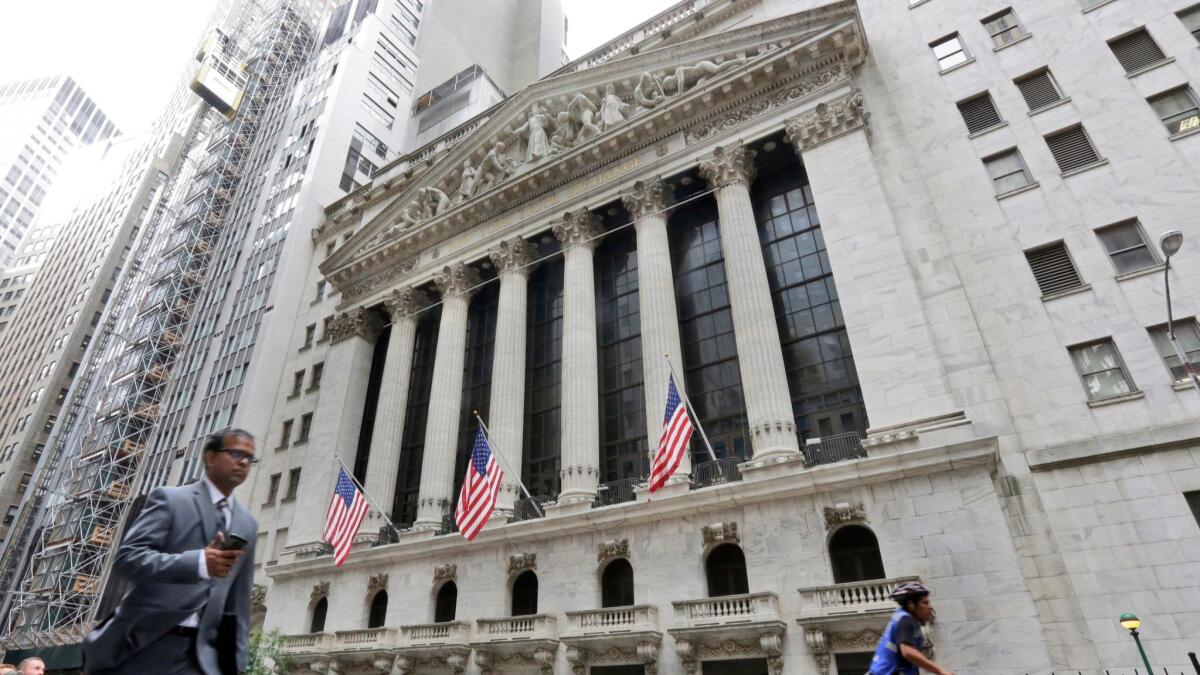Stocks slip, hurt by weakness in banks

- Share via
U.S. stock indexes slipped Monday, weighed down by sinking bank stocks, and the benchmark Standard & Poor’s 500 index had its third daily loss in the last three weeks.
Goldman Sachs had one of the largest drops in the S&P 500 after describing a “muted start to the year,” even though its first-quarter earnings still beat analysts’ expectations. Citigroup slipped after its own earnings report. Banks are leading off an earnings-reporting season that analysts expect to be the weakest in nearly three years.
The S&P 500 slipped 1.83 points, or 0.1%, to 2,905.58. The Dow Jones industrial average slipped 27.53 points, or 0.1%, to 26,384.77, and the Nasdaq composite edged down 8.15 points, or 0.1%, to 7,976.01. The Russell 2000 index of small-cap stocks fell 5.63, or 0.4%, to 1,579.17.
The S&P 500 is still within 0.9% of the record high it set in September. It has had a torrid start to the year after the Federal Reserve said it may not raise interest rates at all in 2019.
“I think we’re going to see equities continue to confound their critics and advance,” said Margie Patel, senior portfolio manager at Wells Fargo Asset Management.
She expects growth for both the economy and corporate earnings to re-accelerate later this year, in large part because of the Federal Reserve’s pledge to hit pause on interest-rate hikes. That follows seven interest-rate increases in the last two years, including the last one in December, that raised worries about a possible recession and helped send the S&P 500 to a nearly 20% loss at one point.
“If you look through history, recessions have been precipitated by the Federal Reserve tightening and causing recessions — telling banks, ‘Don’t make loans,’ and pulling out liquidity,” she said. “This time, they got right up to the brink, and when the market had that violent reaction in December, that made them rethink their approach.”
Optimism has also grown that the United States and China can resolve their trade dispute. U.S. Treasury Secretary Steven T. Mnuchin said Saturday that the world’s two largest economies were moving closer to an agreement.
Some of the market’s biggest losses Monday came from the financial sector. Lighter trading activity during the first three months of the year meant that Goldman Sachs’ revenue fell short of analysts’ estimates. Its shares slid 3.8%.
Like Goldman Sachs, Citigroup also reported stronger first-quarter profit than analysts expected. Its stock slipped 0.1%.
Alliance Data Systems sank 9.3%, the largest loss in the S&P 500, after it agreed to sell its Epsilon business to Publicis Groupe for $4.4 billion in cash. That price was less than what some analysts had valued the business at.
On the winning side was Waste Management, which jumped 2.4% after it agreed to buy its smaller rival, Advanced Disposal, for $3 billion. It will also assume $1.9 billion of debt in the deal. Advanced Disposal surged 17.9%.
The yield on the 10-year Treasury note held steady at 2.55%. It has been climbing since late last month, when it fell to 2.37% amid a crescendo of worries that global economic growth was slowing.
In the commodities markets, the price of oil gave back some of its big gains for the year. Benchmark U.S. crude oil fell 49 cents to settle at $63.40. Brent crude, the international standard, fell 37 cents to $71.18. Both remain up more than 30% for the year.
Natural gas slipped 7 cents to $2.59 per 1,000 cubic feet. Heating oil slipped a penny to $2.06 a gallon. Wholesale gasoline fell 3 cents to $2.01 a gallon.
Gold fell $3.90 to $1,291.30 an ounce. Silver rose 1 cent to $14.98 an ounce. Copper slipped 1 cent to $2.94 a pound.
The dollar fell to 112.03 yen from 112.08 yen. The euro rose to $1.1304 from $1.1296. The British pound rose to $1.0041 from $1.0029.
More to Read
Inside the business of entertainment
The Wide Shot brings you news, analysis and insights on everything from streaming wars to production — and what it all means for the future.
You may occasionally receive promotional content from the Los Angeles Times.










